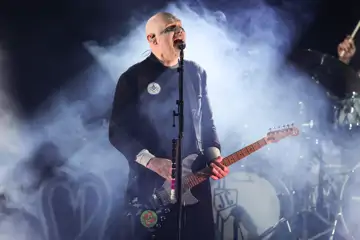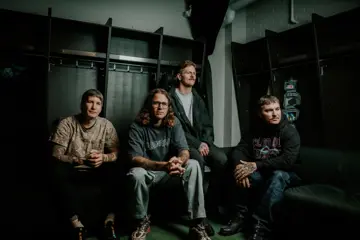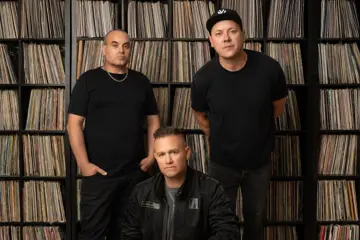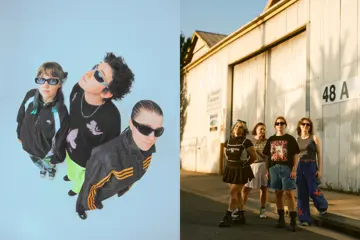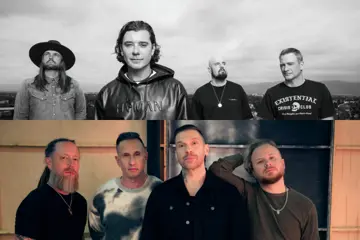He's certainly no stranger to the oeuvre — one of his fledgling musical forays was in a blues band when he was in his teens in the mid-'60s — but it's his first attempt to tackle the form directly on record. It's not the first time that Earle has made a detour away from his trademark country-rock — his 1999 album The Mountain found him tackling bluegrass, and on 2007's Washington Square Serenade he excursioned into the DIY laptop realm — and he certainly has no qualms about broadening his musical palette in this manner.
"I'm really proud of it," he admits. "It's like the bluegrass record was — I set out to do a really specific thing that turned out to be everything I wanted it to be.
"I think a lot of people have misconceptions about where the blues originates — it doesn't really originate in the [Mississippi] Delta."
"[Plus] it gives me a reason to make another record. The business is what it is, you've got to make a record every 18 or 19 months and keep touring — this is what we do now. I'm lucky that I'm fairly prolific but I do have to trick myself into writing now to a certain extent, and just having some new angle to come at always helps."
Don't miss a beat with our FREE daily newsletter
Terraplane focuses primarily on the Texas blues Earle grew up around, but he's quick to point out that the genre's different strands are heavily interrelated.
"We kinda do [distinguish between the forms]," he reflects. "It would be silly for me to emulate the Chicago blues, whatever that it is. There's a Chicago shuffle and a Texas shuffle, and when I play a shuffle it's a Texas shuffle — that's the place where I'm from and what I grew up with.
"I think a lot of people have misconceptions about where the blues originates — it doesn't really originate in the [Mississippi] Delta. The Delta is self-taught musicians emulating records that they'd heard which came from Memphis and New Orleans that were actually notated music by schooled musicians like WC Handy. The blues is almost like a key signature, it's a scale that's based on slanting certain notes in the scale — it's a very technical thing that was originally defined as 'the blues'.
"Then when these self-taught guys from the Delta heard that stuff, and the best of them was Robert Johnson — and not because he was a great guitar player, and that's what a lot of this record is based on, the idea that Robert Johnson wasn't Robert Johnson because he sold his soul to the devil and became a great guitar player. There were guitar players that were better than he was arguably, or at least as good. [Delta bluesman] Son House was the one where you first heard the crossroads legend from, and that was mainly a product of him being fucking jealous.
"I heard [Tennessee bluesman] Yank Rachell with my own ears say that if Robert Johnson was alive then he wouldn't be any bigger of a deal than the rest of them were, which meant that Yank didn't get it either: Robert Johnson was Robert Johnson because of the songs. Not because of his guitar playing and not because he died — because of the songs. He wrote every song that the post-war blues in Chicago was based, period. They were all Robert Johnson songs. Almost every post-war form comes from Robert Johnson — from one Robert Johnson song or another — and that's why he's so important.
"So I tried to include all that stuff from New Orleans, Memphis, the Delta and Texas, which is Chicago basically. Electric blues is electric blues, there's just a difference in the way that the drummers and the rhythm guitar players play between Texas and Chicago."
Terraplane's heartfelt single Mississippi It's Time addresses the fact that Mississippi is the last Southern state to retain the Confederate flag on its state banner, a complex issue plunged into even deeper scrutiny than usual when the perpetrator of a mass shooting in South Carolina in June 2015 where a white supremacist murdered nine African-Americans in their place of worship. Earle is no stranger to singing about societal issues, and he further put his money where his mouth is in this instance by donating all proceeds from the song to the civil rights group Southern Poverty Law Center.
"I guess South Carolina had finally taken their flag down and that left Mississippi," Earle reflects on the song's motivations. "This has been going on for a long time and it just seems in the last few years with Ferguson and the like that race is still an issue in this country: it goes on and on and on. I'm a Southerner [although] I haven't lived in the South for the last ten years, but I did for a long time before that — I was 50 when I moved out of the South — and I'm tired of people insisting that our culture is that flag, and this war that the South lost. I think our culture is the blues and jazz and [author William] Faulkner, and not, [references old Southern joke, 'What's the last thing a redneck says before he dies?'] 'Hey man, watch this!' That's not what the South is."
"The two worst educational systems in the United States are Mississippi and Tennessee in that order, and next comes Alabama and next comes Arkansas."
Earle says that the song resonated well in the States, although obviously not everyone in the South took the song's sentiments to heart.
"No, sometimes they don't," he shrugs. "We've had people walk out, and we had some really threatening email traffic when it first came out. And some email traffic that was designed to show me how wrong I was about the idea of that flag. Unfortunately we never played the song in Mississippi after we wrote it — we don't play Mississippi that often. Sometimes I just write songs because it feels like nobody else is going to, and it's sort of something that needed to be said and needed to be said by a Southerner, that song.
"We did play a lot in the South after we wrote it and by and large the reaction to it was hugely positive — there was always just a handful of people that were upset. There was never a whole audience of people who reacted, most of the time there were tears when the hook came around in the first verse. That was the vast majority of the time, even in the South."
The Civil War was a fascinating conflict for so many reasons and remains in some ways a defining moment for the South, but despite its historical context the Confederate flag just has so many racist connotations now that it seems untenable to still fly it over government buildings.
"That flag is racist, there's not any doubt about it," Earle stresses. "The Civil War was fought about slavery — people try to say it's about states' rights, but the truth of the matter is in my experience that when it comes to the Southern states the less rights the states have the better. The two worst educational systems in the United States are Mississippi and Tennessee in that order, and next comes Alabama and next comes Arkansas and they're all in the South — the six or seven worst school systems are all in the South. The states are poor but they're not that poor — there's actually been a lot of industry move to the South — it's just basically a lot of it's about that they have large black populations and nobody really cares what happens to those people when it gets right down to it. At least as politicians go, because it doesn't get them elected except in heavily black neighbourhoods.
"It's just one of those things that race is still an issue — it is everywhere in the world, but it is especially in the United States. And it's not just in the South — the Midwest Missouri's kind of a 'warrior state' (as it's called) and race is still a huge issue there — something fucking happened in Ferguson. There's racism in a lot of places — there's racism in Australia — and it's just one of those deals, but there's still this retro idea... We're going through this period in our history over here [in the United States] where politicians are getting elected by stringing everybody up about 'the other' — pointing the finger at somebody just to avoid taking responsibility for things being fucked up themselves. Because scaring people gets you elected. One of the ways you can scare people is to tell them that these other people that don't look like them and don't act like them are going to come and take their jobs away or whatever, or their daughters. It's always something really drastic but never really real, and it's been going on for a long time."
Earle's view on gun control — the issue that in some ways kicked off the current wave of debate about the flag — is equally stringent, but this time because of an incident far closer to home.
"I grew up in Texas and I grew up hunting and fishing and I had guns, and when I wrote [1988 murder ballad] The Devil's Right Hand I had a whole trailer full of fucking guns," he explains. "And in the culture I grew up in I didn't see anything incongruous about being a peacenik with a fucking arsenal in his house.
"I've told this story a lot of times, but [musician son] Justin [Townes Earle] when he was 14 his mother sort of handed him off to me because he was out of control, and one of the first things he did when he got to my house was he went to my bedroom and he got under the mattress and found the 14-shot 9mm pistol that I kept there. And he hid it and wouldn't tell anybody where it was and it scared me to death. I didn't know what else to do so I took him to Wilderness Camp — I'm not proud of this, but I just wanted to make sure that he was where the gun wasn't. I dropped him off and wrote them a cheque, and that was in January and they were sleeping in tents so at 4.30am the next morning he called me and told me where the fucking gun was.
"The Midwest Missouri's kind of a 'warrior state' (as it's called) and race is still a huge issue there — something fucking happened in Ferguson."
"I don't know what Justin learned from that but for my part it scared the fuck out of me and I have not had a gun in my house since. So sometimes that's what it takes, but God, haven't enough people died? It's just incredible. It's just gotten worse and worse and worse, and none of this would be happening if there weren't so many fucking guns out there. Barack Obama, everybody talks as if he doesn't understand but he's a constitutional scholar — he knows what the fucking Constitution says — but for my part, and he's not advocating anything that would harm the Constitution in any way, I think they should have a fucking Constitutional Convention. There's people out there I don't want to see driving fucking cars let alone around guns."
All the pro-gun rhetoric based upon the Constitution's Second Amendment — specifically the right to keep and bear arms — is heavily reliant on provisions that just weren't written with today's society — and weaponry — in mind.
"Absolutely, abso-fucking-lutely," Earle concurs with conviction. 'The right to keep and bear arms was about having a militia and standing up to a foreign power that they were worried about oppressing them, because they had declared their independence from a power that they considered to be a foreign power that wasn't on their shores. That's what the right to keep and bear arms is about, that's where it comes from. It doesn't come from protecting your house from criminals or your own government, that's not what it's about — it's a misinterpretation of the Constitution as far as I'm concerned."
On the musical front this Australian sojourn marks the end of Terraplane's touring cycle, but Earle already has his next project in the can — a collaboration with fellow singer-songwriter Shawn Colvin.
"It's just folky, although some of it rocks pretty good," he says of the project. "It's mostly acoustic but there's a couple of electric things on it. We've been touring together off and on and we've been friends for a long time, and it started out just being whitewash on the fence — just a way to go out and sell more tickets and make a little more money and not have to work so hard, because she tours a lot and we know each other so it was fun to do.
"But we discovered that we sing really well together, so it's six songs that we wrote together specifically for this record together, and four really cool covers. There's 14 tracks all together but ten on the actual album — there'll probably be a deluxe version with another couple of tracks. There's two singles — there's a single coming out for Record Store Day in the States which is a seven-inch single with [The Everly Brothers' 1957 smash] Wake Up Little Susie backed with [The Beatles' 1964 tune] Baby's In Black, which are both songs we've done in the show. The two bonus tracks are Someday — which Shawn has recorded before on the [1995] Cover Girl record and I recorded before, because it's my song — and Don't Worry Me Now, which is my favourite Shawn Colvin song. But this is us all singing together — it's nearly all the two of us singing in harmony, I think there's only one song on the record where we sing separate verses.
"The covers that are actually on the album are like You Were On My Mind, the Ian & Sylvia song that We Five did as well and was a hit, and [The Nashville Teens' much-covered 1964 tune] Tobacco Road — we did a really, really, really, really good version of Tobacco Road. It's as good a version as I've ever heard, I think. Then there's a song of Emmylou Harris's called Raise The Dead — which was on the Western Wall record that she did [in 1999] with [Linda] Ronstadt, that song that Emmy wrote — and then there's [The Rolling Stones' classic] Ruby Tuesday. It's pretty diverse. The record is just going to be called Colvin & Earle and that's the name of the group — and it is a group — and that will be out in June of this year."




